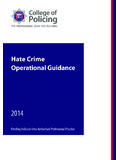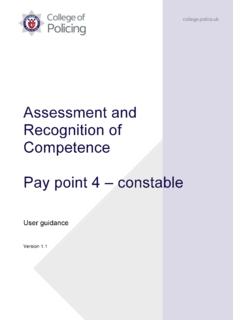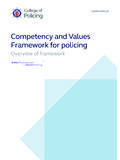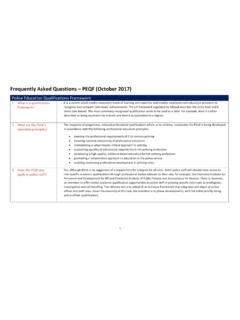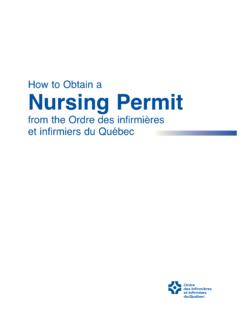Transcription of Memorandum of Understanding - College of Policing
1 1 Memorandum of Understanding The Police Use of Restraint in Mental Health & Learning Disability Settings 2 Contents Acknowledgements 3 Executive Summary 4 Foreword 6 Local Operating Protocols 8 Examples Requiring a Police Response 10 Restraint and Restrictive Practices 12 Learning the Lessons 14 The Next Steps 16 Appendix One Legal Summary 17 Appendix Two - Good Practice Case Studies 21 Appendix Three Police Attendance Protocol 23 Appendix Four The National Decision Model 25 Appendix Five Glossary of terms 26 Appendix Six MH ERG Organisations and Members 27 3 Acknowledgements This Memorandum of Understanding (MoU) could not have been developed and completed without the help, assistance, expertise, time and energy of a wide range of individuals and stakeholders, all of whom are listed in Appendix A.
2 However, in particular, the College of Policing would like to thank some members of the expert reference group who gave considerable additional time and effort outside the meetings and assisted in drafting and developing the MoU Guy Cross (Department of Health), Joanne McDonnell (NHS England), Gary Firkins (South Staffordshire and Shropshire NHS Foundation Trust), Dr Faisil Sethi (South London and Maudsley NHS Trust), Chris MacDonald (NHS Protect), Chief Inspector Dan Thorpe (Metropolitan Police), Detective Inspector David Rees (Welsh Assembly Government Police Liaison Unit) and Chris Witt (Home Office). The College also extends its gratitude to those members of the Expert Reference Group (ERG) who spent additional time chairing sub-groups during the early stages of the work: Eric Baskind (Liverpool John Moores University), Nick Kettle (Metropolitan Police), CI Dan Thorpe (Metropolitan Police), Viral Kantaria (Department of Health), and Chris Witt (Home Office).
3 Particular credit is due to Paul Phillips ( College of Policing ) who coordinated and drove this work up until his retirement from the police service. The College would like to thank mental health charity Mind who, in addition to being members of the ERG, were kind enough to arrange and then facilitate a feedback session with a group of mental health service users and to forward other feedback from service users who read drafts of this document. They offered extremely valuable feedback from the most important perspective of all; that of patients who have received care whilst detained under the Mental Health Act and / or who have been in contact with the police whilst in crisis. Finally, thanks must go to three individuals who have been instrumental in this MoU being conceived and now coming to fruition. Commander Christine Jones, NPCC Lead for Mental Health, instigated the work and there is no doubt that without her determination and leadership this MoU would not be in place.
4 Lord Carlile of Berriew QC CBE, for agreeing to Chair the MH ERG and performing the role with diligence and at times extreme patience. Inspector Michael Brown, Mental Health Co-ordinator for the College of Policing , who has worked tirelessly on developing the MoU and producing the final document in, at times, challenging circumstances. 4 Executive Summary This Memorandum of Understanding (MoU) provides clarity on the role of the police service in responding to incidents within mental health and learning disability settings. The intention is to outline when and how the responsibilities of the police service fit in to the established roles and responsibilities of care providers. This MoU is one of the objectives in the national Crisis Care Concordat (CCC) action plan and it builds upon Positive and Proactive Care (2014)1 which relates to work undertaken by the Department of Health to reduce restraint and restrictive practices in mental health care.
5 All areas must now ensure their local CCC action plans incorporates the approach outlined within the MoU and this is to ensure that people are treated with dignity and respect in a therapeutic environment2. Ensuring effective and appropriate responses to mental health related incidents is core police business 3. This remains true even where healthcare providers are responsible for the health, safety and wellbeing of their staff and patients. It is acknowledged that health providers manage the vast majority of incidents of violence and aggression and that both health providers and police see police involvement as an exceptional event. Health providers have a duty to undertake, implement and review risk assessments for all the services they provide. The police do not have specific powers to restrain a patient for the purposes of medical treatment regardless of whether the treatment is in the patient s best interests however, research by Mind in 2013 revealed there is significant variance in the extent to which healthcare providers call the police for support around restraint and restrictive practices4.
6 Physical restraint can be humiliating, terrifying, dangerous and even life-threatening. It can trigger psychological trauma, especially for people with previous experience of physical or sexual abuse. When police officers are involved this can be even more frightening. People have told us about their shock and fear when police come onto a ward and how this can exacerbate a person s distress and make the situation even more charged. This is especially true for communities which may have a negative experience of Policing and where there is a history of deaths in custody. Going through this has a lasting impact and can set back a person s recovery. People who talked to us wanted mental health staff to be proactive and use their therapeutic skills to de-escalate situations and only call on the police when absolutely necessary.
7 They wanted the police to be better trained in Understanding mental health and to hear directly from people with mental health problems, people who are through the other side of crisis and can share their insights. Whoever is involved in responding to an incident, everyone was clear on the importance of communication and trying to de-escalate the situation from the outset and throughout. 1 Positive and Proactive Care (2014) 2 Crisis Care Concordat (2014) 3 Independent Commission in to Policing and Mental Health in London (2013). 4 Physical Restraint in Crisis (2013), p16. 5 Each situation where the police are called for emergency assistance should be properly assessed on its merits. There will be no assumption that police cannot be involved because the patient is either detained under the Mental Health Act (MHA) or in hospital.
8 The police role is the prevention of crime and protection of persons and property from criminal acts. Police services and health providers should develop or review existing protocols to take account of this MoU. There should be timely joint reviews of incidents where the police use force or where the police did not attend an incident despite the agreed local protocol being properly used. Health providers should review the prevention and management of violence and aggression training they provide for their staff and review all the incidents in 2016 where the police have been called for emergency assistance. Any dispute about pre-incident issues are matters for review after safety has been restored. The MoU represents two years of work by a large number of health, service-user and Policing agencies, independently chaired by Lord Carlile CBE QC. It has been endorsed by the National Police Chiefs Council, Mind, the Royal College of Psychiatrists, the Royal College of Nursing and the Faculty of Forensic and Legal Medicine with a view to other organisations providing their formal support in due course.
9 6 Foreword Police attendance and / or use of restraint in mental health, learning disability and settings. The police service and the health service exist to deliver distinct public service functions which occasionally overlap and require joint working. It is vital to patient, staff and public safety that individual professionals and organisations understand how these functions work when responsibilities overlap in difficult circumstances which may include physical restraint. This document relates to the first of two phases of a national initiative aimed at setting a clear direction on the following; Phase one aims to provide clarity on police attendance at mental health and learning disability inpatient settings and health based Places of Safety, and the use of compulsion and restraint in such settings. Phase two will address restraint related actions outside those settings.
10 Both phases aim to improve clarity and Understanding as to how police officers should exercise their professional judgement in support of colleagues from healthcare professions and when they should be called upon to do so. The overall aim is to ensure the health and safety of patients, professionals and the public. The Independent report of the Mental Health taskforce (2015)5 commissioned by the NHS describes the current state of mental health inpatient care, and includes: Admissions to inpatient care have remained stable for the past three years for adults but - The severity of need and the number of people being detained under the 5 Five Year Forward View for Mental Health, NHS England (2015). Mental Health Act continues to increase, suggesting opportunities to intervene earlier are being missed.
